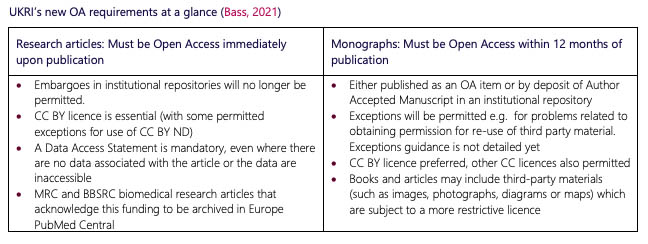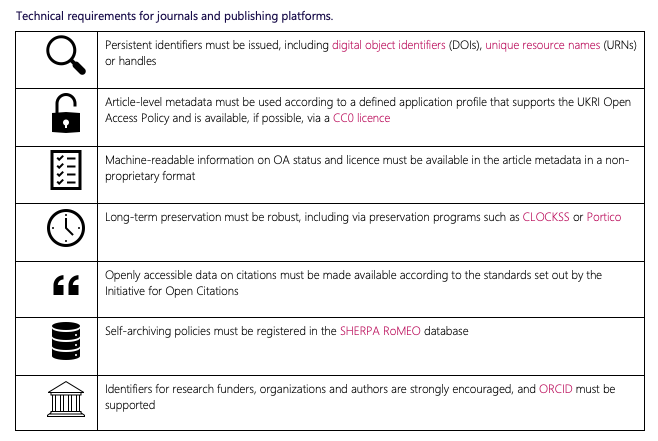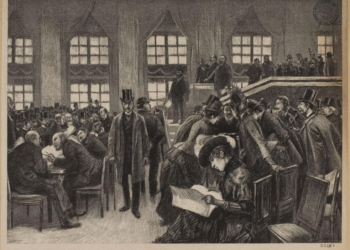Editor’s Note: Today’s post is by Victoria Ficarra and Rob Johnson of Research Consulting. It was written as a precursor to the CCC Town Hall program webinar “Understanding the new UKRI Open Access Policy’’ on UKRI’s Open Access (OA) policy, which took place on Wednesday 27th October. An archived recording of the meeting is available online.
The long-awaited Open Access (OA) policy from UK Research and Innovation (UKRI), the UK’s leading research funder, is here. UKRI will provide almost £50 million ($67 million) per annum of its annual £8 billion ($10 billion) budget to support stakeholders in implementing the new policy. An outcome of a three-year review process, the policy was finalized and published on 6th August 2021, after receiving 350 responses over the course of a year-long consultation.
The policy aims to increase opportunities for access, sharing, and reuse of research outputs. It sits in the wider context of an increased investment from the UK government in R&D as part of its plans to build back better following the COVID-19 pandemic. Although final terms and conditions won’t be finalized until late 2021 for articles and 2022 for books, here are five things you ought to know:

1) Embargoes are out, immediate OA is in
UKRI’s updated policy requires immediate open access for peer-reviewed research articles, including reviews and conference papers, submitted for publication from 1 April 2022. Immediate access will need to be via:
- Route 1 (the ‘gold’ route, though this term is not used in the policy itself), by sharing the version of record (VoR) in a journal or publishing platform; or
- Route 2 (the ‘green’ route), by depositing the author’s accepted manuscript (AAM) or the version of record (if permitted) in an institutional or subject repository.
UKRI’s stakeholder consultation found that two thirds of respondents endorsed the policy’s support for both gold and green routes. However, the requirement for immediate (non-embargoed) deposit under green OA was more controversial, with significant opposition from publishers and learned societies. A further sticking point is the requirement that UKRI funded research must be covered by a permissive CC BY license by default, whichever route is chosen. The policy permits exceptions on a case-by-case, but librarians and publishers alike remain unsure how these are to be managed in practice and on what grounds they will be permitted.

2) To Plan S, or not to Plan S?
The policy aligns with Plan S and other international funders for the most part, recognizing the importance of international coordination, especially in its focus on immediate OA. It also echoes Plan S in its endorsement of transformative (or transitional) agreements, and the rejection of hybrid open access charges outside of these agreements. Indeed, the use of transitional agreements, which allow subscription expenditures to be repurposed to cover OA article processing charges, appears central to the implementation of UKRI’s policy.
UKRI have indicated they will provide a block grant to support compliance with the new policy, but have reserved judgement on whether the use of funds to publish in so-called ‘transformative journals’ will be permitted. OA funds can be used for transitional (transformative) arrangements so long as these fulfil the UK research sector requirements and are approved via Jisc. Jisc will consult further on the topic, leaving open the possibility of UKRI taking a different approach to most other cOAlition S funders. The policy’s implementation date of 1 April 2022 for research articles also means it comes into effect significantly later than those of other cOAlition S organizations.
3) Monographs, finally!
Arguably the headline of the new policy is the requirement for monographs, book chapters and edited collections published from 1 January 2024 to be made open access. The final version of a publication or accepted manuscript must be made available via a publisher’s website, platform or repository, within a maximum of 12 months of publication, and with a preference for a CC BY licence.
UKRI will provide an Open Access Block Grant to support compliance with the policy for both research articles and in-scope longform publications. The policy also includes a number of caveats to acknowledge the still-evolving nature of open access book publishing:
- it is still possible to publish monographs with publishers who do not offer a Gold Open Access option, so long as they are the ‘appropriate’ publisher ‘after liaison and consideration’;
- trade books ‘as defined by author and publisher’ are exempt from the policy, unless the book is the sole output from a UKRI research grant;
- third-party material, i.e., images or anything else to which author does not hold the rights, do not have to be made OA; and
- books deriving from PhD studentships are exempt from the policy, but encouraged to be made OA where possible.
4) The uphill road to rights retention
The UKRI open access policy requires authors wishing to follow the green route to include a statement at the point of manuscript submission to state that the author has applied a CC BY or other permitted license to any AAM version arising. Although this sounds like a simple requirement, in practice there are significant uncertainties for institutions and publishers as to how this approach to rights retention will be implemented, and what messaging should be communicated to authors. As Khoo (2021) has observed, rights retention has the potential to create a significant administrative burden, and create legal risks for authors, readers, and institutions.
Publishers have previously voiced their concerns over Plan S’ rights retention strategy and are anxious that rights retention could place pressures on income and time. In particular, there is concern that providing immediate access to the author’s accepted manuscript hinders publishers’ ability to charge for their services (both through subscription journals and through APCs). Proponents of the policy, however, see it as a valuable tool for researchers to retain rights in their own work, and note that publishers are under no obligation to accept submissions containing the statement.
5) Let’s get technical
UKRI’s new policy specifies a range of technical requirements for journals and publishing platforms, covering persistent identifiers, metadata, machine readability, preservation, open citations, self-archiving policies and ORCID. This long list of asks showcases UKRI’s commitment to interconnected (and open) digital infrastructures but also ups the ante for smaller publishers and vendors.

In addition, the requirement for authors publishing in a subscription journal to deposit the author’s accepted manuscript (or Version of Record, where the publisher permits) in an institutional or subject repository at the time of final publication represents a slight change of emphasis. The UK’s Research Excellence Framework (REF) previously required deposit on acceptance, and so the shift to deposit on publication has implications for existing workflows and processes within institutions, as well as internal communications. In contrast, gold open access workflows are not considered likely to change significantly, beyond ever greater adoption of transformative agreements. UK institutions expect this to shift the balance progressively in favor of gold OA, meaning that some of the challenges associated with green OA should reduce in significance over time.
What’s next?
While the overall shape of the policy is now apparent, a number of details remain to be worked out. One of these is how the new policy will inform preparations for the next Research Excellence Framework (REF), for which open access protocols have yet to be agreed. Sir Duncan Wingham, UKRI’s Executive Champion for Open Research, notes that UK funding bodies will issue guidance for the submission of outputs to the next REF “in due course”, but also assures authors that “any outputs which satisfy the UKRI policy will also satisfy any future REF policy”. UKRI has also indicated that they will implement supporting actions (including policy guidance, stakeholder engagement and support to help uptake of OA journal agreements) to ensure that the policy can be easily implemented by all stakeholders. Part of this will include further guidance on compliance monitoring (which UKRI has indicated they wish to make less burdensome) and a statement on preprints.
The UKRI Open Access policy’s implications were discussed in further depth with Rachel Bruce, Head of Open Research at UKRI, David Prosser, Executive Director of Research Libraries UK, and Ros Pyne, Global Director, Research and Open Access at Bloomsbury Publishing in the CCC Town Hall program webinar “Understanding the new UKRI Open Access Policy”, which took place on Wednesday 27th October. An archived recording of the meeting can be found here.
Discussion
5 Thoughts on "Guest Post — Five Things You Need to Know about UKRI’s New Open Access Policy"
If the funding agencies are going to insist on Gold Open access, they need to start making it clear to their funding recipients that part of the funding provided is intended to cover APCs, and then ensure that’s how the money is spent. Too many researchers choose OA and then cry destitution and beg for a waiver after acceptance.
That is a troubling characterization of authors who requests waivers. I understand you are specifically referring to authors who supposedly have grant funding but may try to get a waiver anyway. I have no idea how widespread that is. But we know for a fact that there are a lot of authors with legitimate need for this type of support and they can be forced to demonstrate financial need in a way that can be stigmatizing. And just like authors in wealthier parts of the world, an LMIC author’s career may be impacted by publication venue. So seeing beg and waiver in the same sentence seems, at a minimum, insensitive.
I’m a librarian in Canada, and trying to understand what the monograph part means. I got the “starting Jan 2024” part so I know there’s lots of time to figure this out. Does anyone have a sense how many books, chapters, etc. are funded by UKRI? How would we even know to look for these, especially if they go the green route? Is anyone planning to make any kind of central index/discovery tool for these?
I just did a quick search using Dimensions to see UKRI funding attached to monographs and chapters published from 2016-2021 and I come up with just over 8,000 items.
UKRI fund the research behind a relatively small proportion of UK-originated monographs (perhaps 15%). A much larger proportion of the latter are funded via QR funding allocated through the UK Research Excellence Framework exercise: a review of the relationship of the latter to Open Access is anticipated in c2023. This important distinction between UKRI and REF funding protocols is not always widely appreciated, not least here in the UK…!



